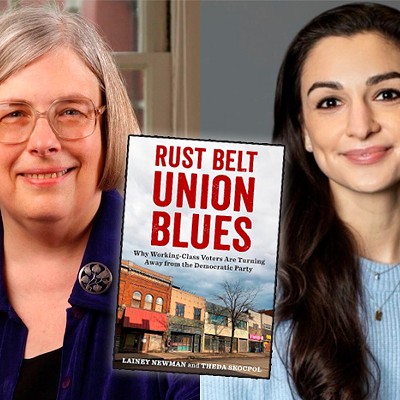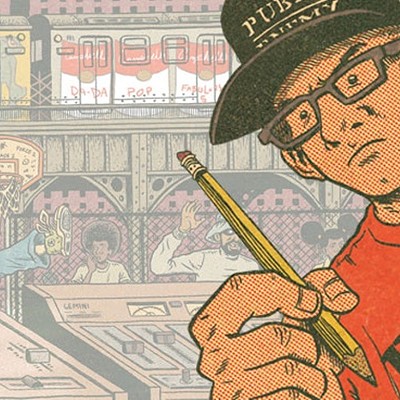The central metaphor in Colson Whitehead's satiric novel Apex Hides the Hurt proves the merits of simplicity. The book's hero is a "nomenclature consultant" who thinks up appealing names for products (including anti-shyness drug Loquacia). Recovering from a meltdown, he's hired to select a name for a whole town undergoing a rebranding effort. But he's plagued by the toe he keeps stubbing -- a mysterious, apparently involuntary affliction he attempts to forget by covering the ever-worsening wound with a brand of adhesive bandage he helped name.
It's a symbolic premise at once so obvious and so rich you wonder whether anyone has exploited it before -- and how, if someone had, it could have been handled any better than Whitehead manages here. With a tone that's dryly ironic while still open to real pain, Apex Hides the Hurt is at once a vivisection of consumerism, a thoughtful allegorical précis on American history and race, and a biting character study of its (pointedly unnamed) hero.
Whitehead, who visits the Drue Heinz Lecture Series on Mon., Feb. 19, is a rising star of American letters, if not yet a household name. Apex, published last year (and fresh out in paperback), is his third critically acclaimed novel. The first, The Intuitionist, was published in 1999, the year Whitehead turned 30. He followed with John Henry Days and The Colossus of New York, a collection of essays about his lifelong hometown.
The Intuitionist, set among 1950s New York elevator inspectors, has been described as a sort of metaphysical detective story; John Henry Days follows the dubious exploits of a young freelance journalist out to set a record for attending publicity events. Whitehead's imaginative blends of fact, fantasy and satire have earned comparisons to Pynchon and Vonnegut; he also lists Ishmael Reed among his influences.
Another reference point is Ralph Ellison. Like Ellison's famed hero in Invisible Man, Whitehead's protagonists have been African American. But in Apex, the consultant, unlike Ellison's invisible man, has mastered the game, succeeding by the standards of a society that's nominally color-blind toward those who bring in the bucks. Yet Whitehead's protagonist too is haunted: struggling with the ghosts of history and with the bone-deep superficiality of the culture he inhabits, nurtures and profits from, enough so that at one point he names himself "fugitive."
"He didn't know what tripped him up. He couldn't remember after all that happened what he stubbed his toe on," Whitehead writes in Apex. "In all probability he stumbled over something small and insignificant, as is only appropriate for such a shriveled, gargoyle word like stub."
Meanwhile, the hero's mission to name the little town uncovers the dusted-over past. Should he retain the name "Winthrop," after the barbed-wire tycoon who built it? Should he select "New Prospera," the rebranding sought by Lucky Aberdeen, the software billionaire who wants to remake it? Or should he choose "Freedom," as it was called by the manumitted slaves who settled there before old Winthrop bought/forced them out?
Whitehead is a fine stylist and word-player. But what anchors his vision, paradoxically, is his calibrated sense of ambivalence, its needle set somewhere between hoping that change -- of society, of self -- is possible and suspecting that it's not. You find Whitehead's wariness even (or especially) in his protagonist's professional triumph: instigating that minor-historic step of offering Apex bandages in a multiculturally sensitive range of skin colors. Of course it is the proper thing to do -- even though everyone knows that the real goal is simply to profit by getting people to identify themselves with a consumer product. "The people chose themselves," Whitehead writes, "and in that way perhaps he had named a mirror."
Colson Whitehead at the Drue Heinz Lecture Series 7:30 p.m. Mon., Feb. 19. Carnegie Lecture Hall, 4400 Forbes Ave., Oakland. $19 ($8 students). 412-622-8866 or www.pittsburghlectures.org















